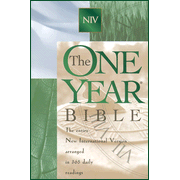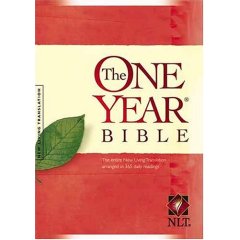The One Year Bible- December 27th
It is the last Wednesday in 2006 so that means this is the last post for the One Year Bible for this year. Next week will be post #1 for 2007 as we start fresh again. I hope you all will be joining us next year as well. If you were at all like me, seeing the end of the book is both exciting and rewarding. It is no small task to read the entire Bible. There are parts that are not much fun to read and there are parts that are hard to relate to. I think the best part for me is seeing how all the pieces fit together. The story as a whole is so much more powerful than some sections taken out of context. I hope that as you hear scripture being read in worship, you can fit it into its context and fill in some of the blanks in your mind to get the whole picture. I have finished my reading so this post will make reference to some things that you may have not read yet. Don’t worry, you can always come back and read the post again. With that, on to the last study of the year...
The Old Testament
This week we spent time in the book of Zechariah. The book of Zechariah is a post-exilic book, meaning it was written to the people who had returned to Jerusalem at the end of the exile in Babylon. It has many interesting and detailed images written in apocalyptic form. It was nice that we were reading from the book of Revelation at the same time since John seems to have used Zechariah for some of his imagery. This is not to say that John plagiarized his book but he did use other sources to help him make sense of what he was seeing. Many scholars have a difficult time with the prophecies in the book because there is no consensus on the historical context of many of the images. We know that some are obviously Christological (The Branch, illusions of Palm Sunday (9:9), looking on the one whom they have pierced (12:10)) and others must have some context in the day that we are too far removed to see. Eric Hartzell has this to say in his commentary on Zechariah:
Zechariah was a contemporary of Haggai. He too had seen the captivity and had returned. With Haggai, he say the people’s apathy toward building God’s house. He joined in the message of Haggai who spoke for God...”Build my house!”
The book of Ezra tells us. “Now Haggai the prophet and Zechariah the prophet, a descendant of Iddo, prophesied to the Jews in Judah and Jerusalem in the name of the God of Israel, who was over them” (Ezra 5:1)
There are many striking pictures in the book of Zechariah. Some of them are surrealistic and in kaleidoscopic colors. Some are stark and strange. Zechariah painted with prophetic brush on the imaginations and consciences of his people. We come upon these paintings today and see that over the years the colors have not faded and the images have not been blurred. He painted hell and heaven; he preached God’s law and his gospel.
Zechariah was also a prophet who spoke words directly describing the coming Savior. In this book we hear words that we recognize from the Passion History of our Lord. Zechariah knew the Savior by inspiration and by prophecy.
The New Testament
It would take me weeks to give you all the info needed to understand the book of Revelation. I took a class that studied the book last Spring and we spent hours trying to figure out what it all meant and to try to make some applications for ourselves. I read the biggest book I ever had for that class (almost 700 pages!!). I learned a lot but I am struggling trying to figure out how I can give you the condensed version. I will give you some highlights from my big commentary authored by Louis Brighton:
The book of Revelation is the last book of the Bible. Whether it was written last or not, the church was led to place it at the end of the canon because she saw in it the completion of God’s revelation. Nothing further would be revealed by God until the second coming of Jesus Christ. Revelation is thus the culmination of the entire story of salvation contained in the Bible. It is the end point of all that is written in both the OT and NT. for it draws all of revelation, both prophetic and apostolic, to its final goal: the exalted reign of Jesus Christ as King of Kings and Lord of lords and the fulfillment of the promise of the new heaven and earth.
As the last book of the Bible and the completion of God’s revelation to his church, it is the lens through which the entire Scripture is to be viewed. Revelation reveals and confirms that Christ was prophetically promised and that his incarnation, death and resurrection happened so that God’s creation could be restored to its original glory and righteousness. Revelation thus points to the final meaning and the final answer to all that is revealed in the Bible. In addition, as the last book, Revelation puts an official stamp on all of God’s revelation, a final confirmation of the divine truth and origin of God’s spoken and written Word. This finality points to the urgency of the last times, in which all things will be brought to an end—an urgency which reminds the Christian to Hold fast to the faith and which encourages the church to complete her mission.
Brighton goes on to say:
The message of Revelation reveals two ongoing phenomena: the terrifying sufferings and horror on earth, and the reign of Jesus Christ as Lord in his heavenly exalted glory. As these two phenomena are described, God’s people on earth are encouraged to cling in hopeful faith to the eternal heavenly glory that beckons them in Christ. In turn they also are strengthened and encouraged for the work of Christ’s mission on earth. The tribulations and sufferings portrayed lead the Christian not to pessimism and despair but to realism. The adversities and troubles prophesied will come to pass, and Christians will suffer because of and through them, as will unbelievers. Such plagues and distresses demonstrate God’s wrath and judgment for the purpose of motivating the godless to repentance. God’s own people also experience these same sufferings and plagues, for the dragon, Satan uses these sufferings and plagues in his attempt to destroy the church and her witness.
With all this being said, the most important thing to get out of a reading of the book of Revelation is that God is in control, his wrath is coming, it is time to repent, God will be victorious and all those who put their trust in him will have the blessings of eternal life. If this is all you got out of the book, then great. The other stuff is there to help make this point clear.
Where We Are Going
A few more days in 2007 sees the reading of the book of Malachi and the finishing of Revelation. Here are the vital stats for Malachi:
PURPOSE: To confront the people with their sins and to restore their relationship with God
AUTHOR: Malachi
TO WHOM WRITTEN: The Jews in Jerusalem and God’s people everywhere
DATE WRITTEN: about 430 B.C.
SETTING: Malachi, Haggai, and Zechariah were post exilic prophets to Judah. Haggai and Zechariah rebuked the people for their failure to rebuild the temple. Malachi confronted them with their neglect of the temple and their false and profane worship.
KEY VERSES: “Surely the day is coming; it will burn like a furnace...But for you who revere my name, the sun of righteousness will rise with healing in its wings. And you will go out and leap like calves released from the stall” (4:1-2)
SPECIAL FEATURES: Malachi’s literary style employs a dramatic use of questions asked by God and his people.
The book of Malachi is another post-exilic book and has many connections with the book of Nehemiah. Kenneth Barker in the book introduction of Malachi in the NIV Study Bible says:
Although the Jews had been allowed to return from exile and rebuild the temple, several discouraging factors brought about a general religious malaise: (1) Their land remained but a small province in the backwaters of the Persian empire, (2) the glorious future announced by the prophets had not yet been realized and, (3) their God had not yet come to his temple with majesty and power to exalt his kingdom in the sight of the nations. Doubting God’s covenant love and no longer trusting his justice, the Jews of the restored community began to loose hope. So their worship degenerated into a listless perpetuation of mere forms, and they no longer took the law seriously.
Malachi rebukes their doubt of God’s love and the faithlessness of both priests and people. To their charge that God is unjust because he has failed to come in judgment to exalt his people, Malachi answers with an announcement and a warning. The Lord they seek will come—but he will come “like a refiners fire”. He will come to judge—but he will judge his people first.
Malachi ends with a warning of the Day of the Lord. As we have discussed before in this blog, this Day is always referring to the Day of Judgment; the day that God will put an end to the wickedness of this world once and for all. It is never a good day for those apart from God, but for those who believe it will be a good day.
Verses to Remember:
Revelation 9:7
Psalm 148:1-2
Revelation 21:6-7
I think the best way to finish out this study is to quote from the last Psalm, number 150:
1 Praise the LORD.
Praise God in his sanctuary;
praise him in his mighty heavens.
2 Praise him for his acts of power;
praise him for his surpassing greatness.
3 Praise him with the sounding of the trumpet,
praise him with the harp and lyre,
4 praise him with tambourine and dancing,
praise him with the strings and flute,
5 praise him with the clash of cymbals,
praise him with resounding cymbals.
6 Let everything that has breath praise the LORD.
Praise the LORD.
I cannot say it any better myself. AMEN!!!


